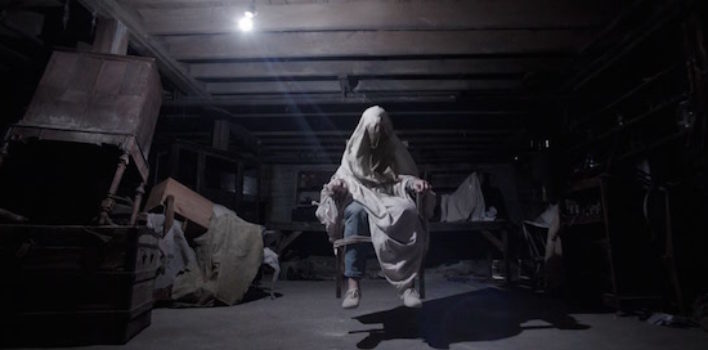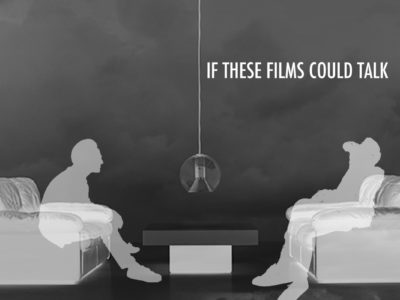Lessons of Love Found in THE CONJURING
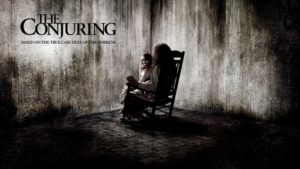 I love horror movies. More specifically, I love horror movies dealing with the paranormal. And to break that down even further, I love horror movies dealing with the demoniac. However, even though I grew up reading Goosebumps books and watching creature features on TV, I surprisingly didn’t care much for horror movies until I became honest and studious in regards to my Christian faith. Yes, I watched movies such as Jaws and Godzilla when I was younger, and I fell in love with Alien at a later age, but again, those fell into the category of “monster movies” for me. I avoided any sort of film that involved demons, possessions, and exorcisms. I suppose I didn’t have reason to believe that supernatural events seen in films like Paranormal Activity and The Exorcist were all that commonplace, or if they even really happened to the extent that history describes them – if they were possible at all in our modern times. It would be fair to have considered me quite skeptical of anything that could have caused a haunting to occur at any location – even though the topic did intrigue me.
I love horror movies. More specifically, I love horror movies dealing with the paranormal. And to break that down even further, I love horror movies dealing with the demoniac. However, even though I grew up reading Goosebumps books and watching creature features on TV, I surprisingly didn’t care much for horror movies until I became honest and studious in regards to my Christian faith. Yes, I watched movies such as Jaws and Godzilla when I was younger, and I fell in love with Alien at a later age, but again, those fell into the category of “monster movies” for me. I avoided any sort of film that involved demons, possessions, and exorcisms. I suppose I didn’t have reason to believe that supernatural events seen in films like Paranormal Activity and The Exorcist were all that commonplace, or if they even really happened to the extent that history describes them – if they were possible at all in our modern times. It would be fair to have considered me quite skeptical of anything that could have caused a haunting to occur at any location – even though the topic did intrigue me.
Soon enough, I gave in to current trends and took a chance on Paranormal Activity. It genuinely freaked me out, and curiously enough. I wanted more. I began consuming supernatural horror and thriller films, sensing a theme throughout all of them that I couldn’t quite put a finger on until I cracked open C.S. Lewis’ The Screwtape Letters. The idea that demons lurk around every corner, out of sight, scheming on how to tempt us from turning away from God resonated powerfully with me, and although we have many illustrations of the tests that demons and Satan give in the books of the Bible, it was through Lewis’ dark satire that it really clicked for me. For weeks afterward, I couldn’t stop comprehending how easy it could be to fall to the Evil One when you don’t have a proper foundation focused on His glory and not the glory of the self. From that point on, I was completely enthralled by movies which focused on demons, demonic possession, and similar ilk.
Today, I follow a similar path which others before me have previously commented on, embracing the fact that there is still a genre of films that, on average, take an objective stance on the nature of good versus evil, utilizing demons as an embodiment of the evil they truly are. Some succeed more than others in cementing their stories into your mind, but what makes those examples stand out from the rest?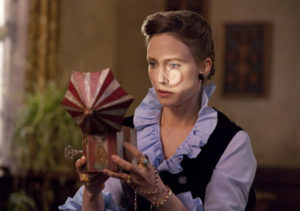
I believe we can find the answer to this question by observing my wife’s opinions and reactions regarding the horror genre. On the whole, she’s scared to death of these kinds of movies, and will generally refuse to watch them on principle. However, there are select criteria that, when met, will merit her approval: we have to watch the movie either in daylight or with the lights on, the movie needs genuine “good guys” that can fight off the featured monster, and whatever evil entity is displayed needs to be vanquished at the end. That being said, she outright refuses to watch the Paranormal Activity films, nor will she view other less-popular horror entries like Oculus, REC., or The Crazies.
However, there is one modern horror classic that I’ve seen her react to more positively than any other horror film I’ve viewed with her: James Wan’s 2013 film The Conjuring. Set in the early ‘70s, The Conjuring focuses on a large family that moves into an even larger farmhouse which, unbeknown to them, has a noteworthy and sinister history behind it. Threatening activity within the home becomes so malicious that the mother seeks the assistance of two of the most renowned paranormal investigators in history – Ed and Lorraine Warren. The Warrens quickly realize how serious the stakes are and willingly put their lives on the line in order to save the oppressed family from utter destruction.
Is the film scary? Most certainly. It has many moments that are likely to speed up your heartbeat, and I found myself tensing up a number of times, even though I never seem to get outwardly frightened with horror films. But do our “good guys,” the Warrens, succeed in their mission? Being as the Warrens are historical figures (with the real-life Lorraine Warren serving as a consultant for the film), it’s not much of a spoiler to say that they do. But it’s not the happy ending that sold my wife and myself on the movie- it’s how the Warrens fought off the demon to get to that satisfying conclusion.
 Unlike many contemporary horror films, God exists in Wan’s The Conjuring. The Warren’s faith in God is not only what they use to ward and fight off demons, but is also what their personal lives are founded upon. Historically, Ed and Lorraine met when they were both 16 years of age and were married at 18. While they were both committed Roman Catholics, they made it their duty to help anyone who was being oppressed by the paranormal, whether they came from a religious background or not. Their sole commitment to helping those made in the image of God sets them apart from other investigators, as the Warrens never asked for any money for their services except for travel expenses (airline fare, lodging, etc.).
Unlike many contemporary horror films, God exists in Wan’s The Conjuring. The Warren’s faith in God is not only what they use to ward and fight off demons, but is also what their personal lives are founded upon. Historically, Ed and Lorraine met when they were both 16 years of age and were married at 18. While they were both committed Roman Catholics, they made it their duty to help anyone who was being oppressed by the paranormal, whether they came from a religious background or not. Their sole commitment to helping those made in the image of God sets them apart from other investigators, as the Warrens never asked for any money for their services except for travel expenses (airline fare, lodging, etc.).
The Warrens also exhibited the love they had for their clients to each other and to their only child, Judy. Rarely do we see our protagonist couple not working together in harmony, and when we do see them disagree, they listen to each other and strive to quickly find a compromise. In one crucial scene, Ed tells Lorraine that she should leave the room as a dangerous exorcism is about to occur. Even though she had recently had a life-changing event with another exorcism they had helped perform, Lorraine refuses, reminding Ed, “God brought us together for a reason. This is it.” While initially appearing reluctant, Ed yields to Lorraine’s statement of faith, and the two are able to perform the exorcism as a team.
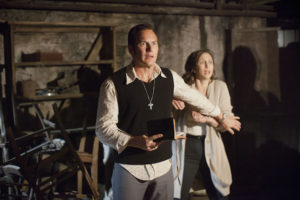 When asked about the approach she took to portray Lorraine Warren, Vera Farmiga stated the following about the Warrens: “They have a connection that is undeniable. So for me, coming aboard this was going to be very much about them. It is a love story to me.” Maybe that’s why people like my wife latch on to The Conjuring. It’s not just about the visual horror, but instead about the characters, which is something any good story should focus on. Unlike other horror movies, James Wan also spends time developing the family enduring the haunting and subsequent demonic possession. Because Wan accomplishes this, not only do we care about the family’s well-being but it also makes us root for our protagonists all the more. Yes, the Warrens are in substantial danger throughout their investigation, but it’s their love for the family, their love for each other, and the love they have for God that makes them vulnerable. If a character isn’t vulnerable to the dangers they experience throughout the story, the narrative simply isn’t compelling. While other horror movies make their characters physically vulnerable by stripping them down to primitive survival instincts, The Conjuring gives us two characters who are made emotionally vulnerable by the greatest power of all – love. Not many of us can relate to becoming the last one standing in a horror movie, surviving only by your will to live, but everyone realizes how powerful love can be.
When asked about the approach she took to portray Lorraine Warren, Vera Farmiga stated the following about the Warrens: “They have a connection that is undeniable. So for me, coming aboard this was going to be very much about them. It is a love story to me.” Maybe that’s why people like my wife latch on to The Conjuring. It’s not just about the visual horror, but instead about the characters, which is something any good story should focus on. Unlike other horror movies, James Wan also spends time developing the family enduring the haunting and subsequent demonic possession. Because Wan accomplishes this, not only do we care about the family’s well-being but it also makes us root for our protagonists all the more. Yes, the Warrens are in substantial danger throughout their investigation, but it’s their love for the family, their love for each other, and the love they have for God that makes them vulnerable. If a character isn’t vulnerable to the dangers they experience throughout the story, the narrative simply isn’t compelling. While other horror movies make their characters physically vulnerable by stripping them down to primitive survival instincts, The Conjuring gives us two characters who are made emotionally vulnerable by the greatest power of all – love. Not many of us can relate to becoming the last one standing in a horror movie, surviving only by your will to live, but everyone realizes how powerful love can be.
In another of his popular works called The Four Loves, C.S. Lewis writes the following:
“To love at all is to be vulnerable. Love anything, and your heart will certainly be wrung and possibly be broken. If you want to make sure of keeping it intact, you must give your heart to no one, not even to an animal. Wrap it carefully round with hobbies and little luxuries; avoid all entanglements; lock it up safe in the casket or coffin of your selfishness. But in that casket – safe, dark, motionless, airless – it will change. It will not be broken; it will become unbreakable, impenetrable, irredeemable. The alternative to tragedy, or at least to the risk of tragedy, is damnation. The only place outside Heaven where you can be perfectly safe from all the dangers and perturbations of love is Hell.”
It’s telling that the one thing that makes The Conjuring compelling for people that don’t prefer horror movies is something that demons themselves can’t succeed in fighting against – a sacrificial love for the imago Dei similar to the love that Christ showed for all of us; a love that rejoices in the truth, bearing, believing, hoping, and enduring all things. With that kind of an arsenal, what hope does any demonic force have in besting those that brandish that power?


